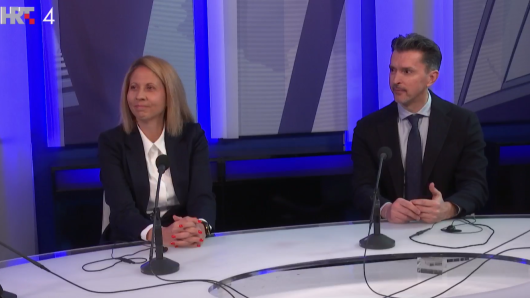The Treaty of Accession, which Croatia and the European Union will sign in December, is a result of six-year-long negotiations and the document covers Croatia's rights and obligations as the future EU member, arrangements and transitional periods for the country's adjustment to the acquis communautaire.
The exact date and the place of the signing ceremony have not yet been determined and according to the latest unofficial information, the treaty is likely to be signed in Warsaw, the capital of Poland which is the current chair of the EU, in the mid-December.
Apart from the introductory part, the document contains the Act concerning the conditions of accession of the Republic of Croatia and the adjustments to the Treaty on European Union as well as nine annexes with the outcome of the accession negotiations which were opened on 3 October 2005 and closed on 30 June 2011.
Upon the signing, the treaty should be ratified by all 27 European Union member states. In Croatia citizens will also go to the polls for the referendum on their country's EU membership.
According to the treaty, the deadline for depositing the ratified documents in the archives of the Government of the Italian Republic, which will remit a certified copy to each of the Governments of the other Signatory States, is 30 June 2013, and the treaty shall take effect on 1 July 2013 provided that all documents about the ratification are deposited on time.
With the entry into the EU, Croatia withdraws from all agreements on free trade with third countries, including the Central European Free Trade Agreement, and enters agreements signed by the current EU members state and the European Union with third countries or with international organisations.
From the signing of the agreement to the country's admission to the EU, the European Commission will monitor the fulfilment of all obligations which Croatia undertook in the accession negotiations and it will submit reports on the matter to the Council and the European Parliament in the autumns of 2011 and 2012.
"The Commission’s monitoring shall focus in particular on commitments undertaken by Croatia in the area of the judiciary and fundamental rights (Annex VII), including the continued development of track records on judicial reform and efficiency, impartial handling of war crimes cases, and the fight against corruption," reads the English version of the treaty.
"In addition, the Commission's monitoring shall focus on the area of justice, freedom and security, including the implementation and enforcement of Union requirements with respect to external border management, police cooperation, the fight against organised crime, and judicial cooperation in civil and criminal matters, as well as on commitments in the area of competition policy including the restructuring of the shipbuilding industry (Annex VIII) and the restructuring of the steel sector (Annex IX)."
The Commission is expected to issue "six-monthly assessments up to the accession of Croatia on the commitments undertaken by Croatia in these areas as an integral part of its regular monitoring tables and reports."
The document does not specify any concrete measures in the event of Croatia's failure to carry out its commitments.
"The Council, acting by qualified majority on a proposal from the Commission, may take all appropriate measures if issues of concern are identified during the monitoring process. The measures shall be maintained no longer than strictly necessary and, in any case, shall be lifted by the Council, acting in accordance with the same procedure, when the relevant issues of concern have been effectively addressed."
The accession negotiations and the adjusted national legislation with the EU standards regulate many areas with respect to the everyday life of the Croatians.
The negotiations have defined the simplified terms for crossing through the so-called Neum corridor on the territory of Bosnia and Herzegovina.
Consignments of products coming from the territory of Croatia and transiting through the territory of Bosnia and Herzegovina at Neum corridor before re-entering the territory of Croatia may be exempted from the veterinary checks if they are transported in closed vehicles with uniquely numbered seals. The date and time of leaving and re-entering the territory of Croatia of the vehicles transporting consignments shall be recorded, so that the total time of transit can be calculated.
Croatia shall ensure that consignment must not be allowed to re-enter its territory where a vehicle's seal has been broken or replaced during transiting the Neum corridor and/or the total time of transit considerably exceeds the acceptable total time of transit, given the total distance of transit unless the competent authority has carried out an assessment of the risks to animal and public health and has adopted effective, proportionate and targeted measures based on that assessment, according to the treaty.
With its entry into the EU, Croatia will have to abolish the zero rate of the Value Added Tax (VAT), but will be able to introduce minimum or lowered VAT rates.
During the negotiations, Croatia and the EU agreed on a seven-year transitional period with the ban of the foreigners' purchase of agricultural land.
The seven-year transitional period could be extended for additional three years, provided that there is sufficient evidence that, upon expiry of the seven-year transitional period, there will be serious disturbances or a threat of serious disturbances on the agricultural land market of the Republic of Croatia,
Member States can introduce restrictions for the employment of Croatian nationals to two, five and seven years at the maximum, and Croatia can apply reciprocal measures for workers from EU members that impose restrictions on the employment fro Croatians.
The negotiations were conducted on areas divided in 33 policy chapters that should be aligned with the EU acquis communautaire.
The policy chapters No. 34 and 35 on Institutions and Other Issues respectively were not subject to the negotiations. The chapter No. 34 defines the participation of Croatian representatives in EU agencies and the status of the Croatian language which will become an official language in the Union with Croatia's admission.

































